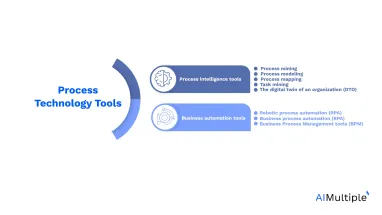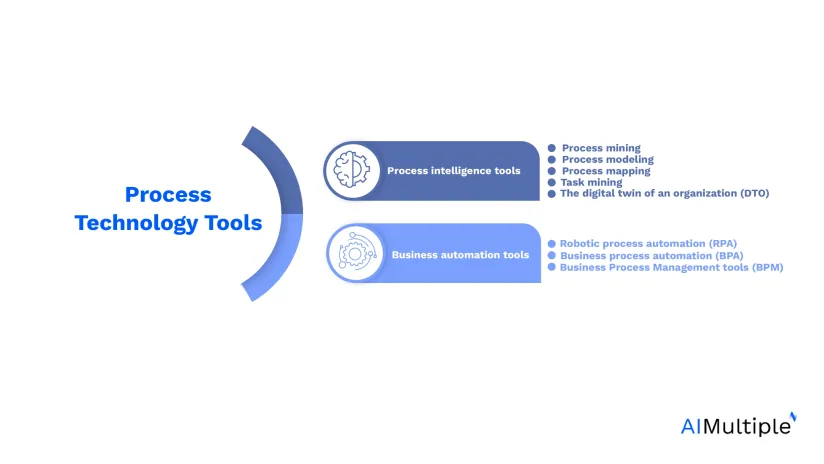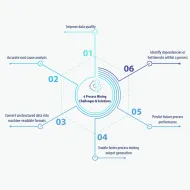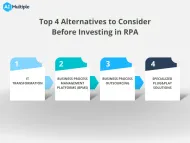What is Process Technology & 3 Reasons to apply it in '24?


Decision-makers look for ways to monitor, manage and optimize their processes, which is why 83% of them aim to apply process technology. Nonetheless, business analysts, experts, and leaders usually fail at choosing and implementing one relevant tool.This failure results from lacking a framework that lists process technology tools and their contribution to the business world.
Therefore, this research explains process technology and the three benefits that business leaders can gain from it.
What is process technology?
Process technology refers to the tools that create, analyze, manage and improve processes in an organization by employing machine learning, such as algorithms. The term originates in manufacturing, but today it can be used in a business context.
What are process technology tools?
Process technology tools include:
Process intelligence tools
Process intelligence tools gather and analyze process data to help business leaders and analysts to:
- Discover their workflow and the people involved
- Estimate the time the process requires
- Identify the bottlenecks in the process.
Process mining
Process mining is a technology that discovers, monitors, and improves business processes by extracting, analyzing, and visualizing the event logs data from IT systems and web applications.
Process modeling
Process modeling is a discipline that visualizes operations and workflows to provide an end-to-end overview of the process.
Process mapping
Process mapping depicts the process flow by using symbols that all employees can easily follow to facilitate communication and increase process visibility.
Task mining
Task mining helps comprehend the task execution in a process by capturing user interaction data, such as recordings and screenshots.
The digital twin of an organization (DTO)
A digital twin of an organization (DTO) generates a virtual replica of an entire organization or a department to bring process visibility and simulation capability. By doing so, it facilitates implementing data-driven changes.
Business automation tools
These tools automate tasks and functions to transform costly, error-prone, and time-consuming processes into more efficient workflows and operations.
Robotic process automation (RPA)
Robotic Process Automation (RPA) is a solution utilizing bots to perform tasks and operations. These bots monitor users’ interactions when they execute processes. Then , they replicate the execution by using screen scraping (rule-based bots) or leveraging AI algorithms, such as NLP and OCR (AI-enabled bots).
Business process automation (BPA)
BPA software automates repetitive and manual tasks for higher efficiency and less cost. BPA tools typically rely on the user interface for automation; however, the line between BPA and RPA solutions is blurring.
Business Process Management tools (BPM)
Business process management monitors and standardizes company processes to execute operations effectively. BPM efforts are automated with the help of BPM software, process intelligence tools or process automation tools.
The benefits of process technology
Three benefits these tools offer to business leaders and analysts include:
1. Improve customer satisfaction
Process technology tools can enable analysts to reduce lead and reaction times, identify and eliminate bottlenecks, and set standards, thus eventually enhancing customer satisfaction.
Constant process monitoring facilitates business leaders to react quickly to change or the emergence of an issue. Process technology tools spot them seamlessly when there is a delay or error in the process workflow. Such improvements reflect on the process performance, shorten the time , and thereby improve the overall customer experience.
In some cases, process technology displays the process pathways that are already efficient but not standard across the organization. Analysts can use process technology to determine the optimal processes and harmonize these processes. Consequently, these tools can decrease conflicts among teams and departments while increasing customer satisfaction.
2. Ensure process efficiency and accuracy
Business process technology tools can ensure process efficiency, accuracy, and quality by discovering, analyzing, modeling, streamlining, and automating their processes.
Process technology tools can automate data collection and assess process and employee performance accurately. Some of the tools allow leveraging the insights from the data to set KPIs that measure the processes and employees to detect the ideal processes. These metrics and process maps can help track the errors and bottlenecks to eliminate them. As a result, companies can operate smoothly.
Process technology can assist in establishing benchmarks as a metric. . For example, process mining can leverage insights from the data and set the benchmarks or upload an existing model to compare against the actual processes and predict the level of compliance. Also, automation bots can automate compliance checks. Therefore, Compliance and audit become less time-consuming and demanding.
3. Reduce costs
Process technologies allow business leaders and analysts to understand their operations and identify repetitive and unnecessary tasks by visualizing and discovering processes.
Analysts can use these insights to modify the tasks and automate these activities by implementing RPA bots. The analysts can reduce operational costs by removing unnecessary steps and automating repetitive and manual tasks. Thus, automation can generate more time to allocate to other activities with a higher value for the company.
Further reading
Read our in-depth articles to learn more details on these process technologies by checking out the use-cases and case studies:
- Top 9 Use Cases of Digital Twin of an Organization (DTO)
- 44 Use Cases and Applications of Process Mining
- 55 Process Improvement Case Studies & Project Results
If you believe you need to leverage a process technology tools but do not know where to start, review our data-driven RPA and Process Mining vendor lists.
If you need help, let us help you to find the right vendor:



Comments
Your email address will not be published. All fields are required.